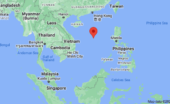Re Ian Bremmer 'Could third-party candidates upend the 2024 US election?' 3 April The current political movement in the USA…
Wednesday Night #1468
Written by Diana Thebaud Nicholson // April 21, 2010 // Reports, Wednesday Nights // Comments Off on Wednesday Night #1468
The warmly-applauded opening announcement concerned Herb Bercovitz who has been proposed by Mayor Peter Trent as a recipient of the Lieutenant Governor’s award for volunteerism.
Victoria Kiyatkina introduced Ian Branum, a multi-talented U.S. Naval Reserve Officer recently returned from being USN’s point-man in Bangladesh and soon to go to Iraq, while Diana introduced Marc Garneau’s Riding Office go-to person and right arm, Margaret Guest. In addition to her political acumen, Margaret has unique experience, working and living in Afghanistan near the Pakistan border from 1981-85.
The SEC v. Goldman Sachs
The current Securities and Exchange Commission’s lawsuit against Goldman Sachs and one of its employees comes as somewhat of a surprise in the light of the recent worldwide financial chaos and the subsequent sensitivity of the public, but more especially, of the financial institutions, to the ensuing disastrous results. The issue is not that the allegations may or may not be justified. That will be determined by the Courts. The sub-issue is the relationship, especially in the United States, between the seemingly forgiving nature of the U.S. government towards the donors of large contributors to political parties. Whether or not the absence of limits to contributions influences the Court’s decision and to what extent large corporate contributions may or may not determine political decisions, as long as contributions are not capped by law, the possibility of undue influence of large contributors on elected representatives, remains. The surprising allegations against Goldman Sachs, especially if proven, thus take on an importance far beyond the allegations as to whether money will continue to have undue influence over public policy as is currently alleged by some, or will a successful lawsuit against Goldman Sachs be considered proof that the current policy is working, and that no legislative changes are therefore necessary? If logic prevails, further steps will be taken to protect investors and pension plan funds.
The economy
There is great satisfaction, at least partially justified, in the renaissance of the economy, as measured by Stock Exchange indices, but it is not clear that we have been or are managing the crisis well. We take pride, in having succeeded in surpassing 2007 numbers, but there is no road map and factors derailing growth such as aging of the population and natural disasters have the capacity of introducing new challenges for which we are not prepared, the current volcanic eruption being a sample, perhaps a foreshadowing.
The stock market is said to have been “climbing a wall of worry” for the past two years. With bond interest at its current low rate, equity appears to be the only rational choice for investment. However, the past three weeks have witnessed several interesting changes including a decline in wages, as well as the growing risk of imbedded inflation. The Canadian economy remains strong, but the new Governor of the Bank of Canada, said to be leading a relatively inexperienced, more aggressive team, has the potential for putting a lot of upward pressure on the Canadian dollar in the unpredictable long, medium and short terms.In the long range view, there is a forty year rhythm in the stock market and Canada and Australia are at the point where commodities are dominant, with stocks anticipating a long upward trend.
World economy
Although Greek and the European Union concerns are being addressed, other factors are expected to affect world economies. As older people retire they tend to be succeeded by younger people at lower wages. China’s place in the world has changed significantly, its wealth, influence and acquisitions influencing the equation. Rare earth minerals including potassium, of which China holds ninety-seven percent of the world’s known supply, will be important in the development of environmental technologies.
There is increasing interest among large Canadian institutions in the environment arising from the demands of their investors. The issue is especially important to real estate investors.
Privacy and the photocopier
In London, the ubiquitous street cameras have played a large part in the identification and subsequent arrest of the subway bombers. Curiously, despite the fact that most Canadians who use public sidewalks do not hide their identity as they wander down our public streets, we object to being photographed as we do so. We hold details of our state of health, sometimes our age and other personal details, in the greatest secrecy. It therefore comes as a surprise to learn that, not only the hard drives on our computers over which we hold some control, but every photocopier, at work, at the local pharmacy, at Bureau en Gros or elsewhere, also retains on a hard drive (many were surprised to learn that photo copiers have hard drives, let alone memories), copies of every document ever photocopied on it. [CBS Report: Copy Machines Retain Copies On Their Hard Drives] When added to the amount of information that appears in cyberspace in such sites as Google and on social networks, it would appear that the word “confidential” is slowly losing its original connotation but our inability to change the situation leads us to ignore it, making the less potentially harmful street camera the easier target.
Canadians might take cold comfort from the Auditor General’s recent report that seems to indicate that Ottawa’s computers are so old that they will soon crash and thus all your information will be lost – P.S. No cheques! [Old computers put tax refunds, cheques at risk: auditor].
Afghanistan
Afghanistan has been viewed as a quagmire from which no invader escapes unscathed. Many who have been there see it quite differently for various reasons, including the training of our armed forces for a new type of war, the war of the future, as well as the importance of Canada’s role in building cooperation and peace between warring factions.
Global governance
The world’s increasing vulnerability to natural disasters so clearly in evidence through the abrupt collapse of air travel and international trade following the volcanic eruption, clearly indicates that since the nineteenth century, an increasing number of local events have a global effect demanding a global response, hence global governance. An understated example would be the awareness that there is an overwhelming probability that a similar crisis will occur within the next half century involving an inevitable scarcity of petroleum, if the problem is not acknowledged and addressed globally.
******************
The Prologue
REMINDER: As previously advertised – Cleo Paskal is speaking at McGill on Wednesday from 6-7:30 PM Details
For the history buffs amongst us: April 21 is the anniversary of the date that Henry VIII ascended the throne (not a happy occasion for future Royal wives and many others who were to stand in his way); the traditional date assigned to the founding of Rome by Romulus and Remus; the anniversary of the inauguration of Brasilia as the new capital of Brazil; and (in 1918) the day that The Red Baron was shot down and killed. It is also Queen Elizabeth II’s birthday. [John Curtin, pay attention.]
Obviously the Goldman Sachs story dominates the news and there’s a new and improbable name – Fabrice Tourre – to go with it. The NYT is all over the story, but HuffPost has an AIG connection that others seem to have missed; we have collected the salient items in one place. [We would also call your attention to the Vanity Fair January profile of Goldman, The Bank Job] Tony Deutsch comments: “the problem I see with this story is that it claims that Goldman may be found guilty of fraud. If that stands up in court, it will weaken attempts at reform, the argument being that fraud was illegal all along,and all that can be done is to strengthen enforcement. Along with the story a few days ago that Lehman engaged in window-dressing (probably also illegal), all we seem to be left with is Volcker’s idea that those who hold the savings deposits of the public should not engage in proprietary trading. Madoff does not help matters either; we cannot outlaw Ponzi schemes once more.”
The other cloud on the horizon is, of course, the Act of God perpetrated on aviation by the Icelandic volcano with the unpronounceable name – Eyjafjallajökull. (Note: there are those who believe that it was caused by immodest women, or worse) While airspace is gradually being reopened in Europe, the bad news is that “scientists worry the activity could trigger an even larger eruption at the nearby Katla volcano, which sits on the massive Myrdalsjokull icecap and has erupted every 80 years or so – the last time in 1918.” And there is More As the ash settles – as it were – airline companies are furious at European governments for allegedly mishandling the affair; with his usual tact, the head of IATA has leapt into the fray charging that “This is a European embarrassment and it’s a European mess”. Somewhat more seriously, there appears to be a growing suspicion that the Volcanic Ash Advisory Centre (who knew?) at Britain’s Meteorological Office may have started the chain of events leading to the airspace shutdown based on a computer model rather than actual scientific data. Meantime, what are the probabilities of government bailout for the airlines?
In the face of Nature’s fury, world news has taken a slightly lower profile, although there is much that is not good. Ethnic violence continues in Kyrgyzstan , while the findings of the UN enquiry into the assassination of Benazir Bhutto are likely to cause some headaches amongst the Pakistani élites. Sudan’s elections were certainly flawed, but the world is caught in a bind – disallow the elections and derail next year’s referendum on independence for southern Sudan. Clever (albeit highly unpleasant) man, Mr. al-Bashir. The situation in Thailand appears to be escalating, with no obvious resolution, and South Korea is definitely unhappy about the loss of its destroyer, which it now appears was due to an external blast.
Maureen Farrow will join us again – last week’s evening in her company was stimulating and we look forward this week to introducing more on Emerging Markets, following the BRIC meeting last week in afore-mentioned Brasilia. As usual, we have done your homework for you.
Closer to home, while we have avoided all references to Ms Guergis, now Maxime Bernier, who has definite aspirations to return to Cabinet, is being held up as her role model (“What Helena Guergis can learn from Maxime Bernier“). Read and weep – or not – depending on your political persuasion.
On a much more positive note, two feel-good development stories.
The first is the seemingly vastly improved Griffintown project which was approved by Montreal. There are still flaws, but we remain hopeful that adjustments will come.
The second is what appears to us to be a brilliant solution to the nagging problem of the Westmount arena. Kudos to Peter Trent for having enabled a solution that actually increases the green space, answers most citizens’ needs (except for the indoor pool, which he explains is simply too expensive) and adds an attractive element to the park. We urge all Wednesday Nighters who are residents to read the letter that was delivered to your home; or check the website (unfortunately the plans aren’t posted). Peter asks that you also fill out the (very short) questionnaire.
We wish you a happy and pro-active Earth Day, April 22. [You did note that Canaccord has published four stock picks for the occasion? The companies are chosen for their conservation and resource optimization – we note that Green Power Generation is not one of them.]



